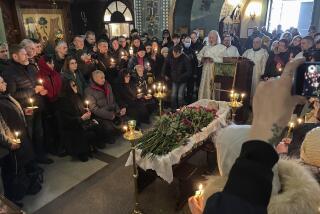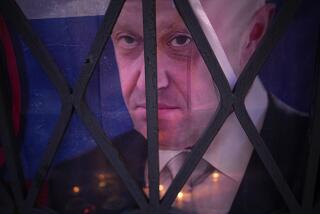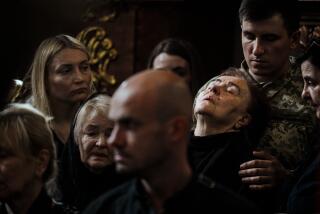Few Soviet Leaders Attend : Gromyko Buried Without Fanfare
- Share via
MOSCOW — Former Soviet President and Foreign Minister Andrei A. Gromyko was buried in a quiet corner of a Moscow cemetery today with little ceremony and only a token number of Soviet leaders present.
About 400 official guests inside the Novodevichy cemetery and a few dozen onlookers behind steel barriers hunched under umbrellas during the 15-minute funeral that was held in a steady drizzle.
Because Gromyko held no public office when he died, he received a private funeral, but the official media gave accolades to the man who served as foreign minister for 28 years and retired gracefully from the presidency nine months ago when Mikhail S. Gorbachev eased him out of power.
Gromyko died Sunday at age 79.
“His name is connected with the huge successes of Soviet foreign policy, directed at the relaxation of international tension and consolidation of world peace,” Vitaly I. Vorotnikov, premier of the Russian federation, told mourners at the cemetery.
Vorotnikov, a member of the ruling Politburo, was the most senior Soviet official at the ceremony.
President Mikhail S. Gorbachev and Eduard A. Shevardnadze, who succeeded Gromyko as foreign minister, were on an official visit to France.
Gromyko was buried among the ornate graves of the Soviet elite at Novodevichy, the most prestigious Soviet resting place after Red Square. A military honor guard fired a salute as workers shoveled soil over his red-and-black coffin.
Gromyko’s son, Anatoly, who followed in his father’s foreign policy footsteps and heads a Kremlin think tank on African affairs, shook his head solemnly as he held the hand of his veiled, weeping mother, Lydia.
29 Medals Displayed
As he lay in state earlier, Gromyko’s body was surrounded by his 29 medals displayed on red cushions. Among the awards were Hero of Socialist Labor and the country’s highest civilian honor, the Order of Lenin, which he received six times.
Some Soviets have said Gromyko shared the blame for foreign policy mistakes, such as the 1979 Soviet intervention in Afghanistan. The confrontational approach he represented was reflected in the nickname “Mr. Nyet,” which he acquired because of his many vetoes in the U.N. Security Council.
Those attending the funeral echoed the reserved respect expressed by the Soviet leadership.
“He represented old times,” said navy officer Andrei N. Pochtarev. “Now we must have a new approach. Times have changed.”
More to Read
Sign up for Essential California
The most important California stories and recommendations in your inbox every morning.
You may occasionally receive promotional content from the Los Angeles Times.










